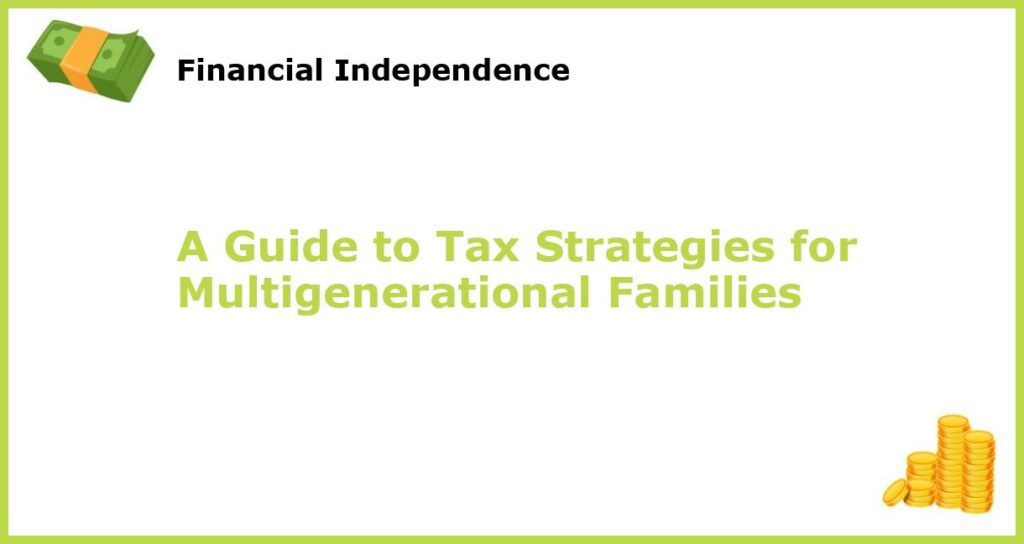Are you part of a multigenerational family, and you are finding it challenging to keep track of everything that concerns taxes? Well, you are not alone. Multiple sources of income and generations involved can make it complicated to manage taxes. That’s why proper tax planning is critical, so let’s explore this guide on tax strategies for multigenerational families.
1. Understanding the Importance of Tax Planning
Tax planning involves devising intentional decisions aimed at reducing the amount of taxes paid on money earned. Financial planning experts advise that to achieve long-term financial stability, tax planning should be a part of an individual’s financial strategy.
In a multigenerational family, tax planning can help manage taxes efficiently by providing strategies to minimize taxable income and maximize deductions. Taking the time to plan and create a bespoke tax strategy can reduce tax-related uncertainty and stress.
2. The Benefits of Tax Planning for Multigenerational Families
One of the primary benefits of tax planning is reducing the amount of taxes an individual or family pays. This results in more disposable income, which can help families fulfill their financial goals. Effective tax strategies can also limit the impact of taxes on an individual’s retirement income.
Proper tax planning can also help protect your assets by minimizing the amount of money lost to taxes. This is particularly vital in multigenerational families, where the transfer of assets must meet the unique needs of different family members.
Additionally, tax planning can help families plan intergenerational wealth transfer. Experts advise using various tools such as wills and trusts to ensure that future generations of the family are adequately catered for, even after an individual passes away.
3. Taking Advantage of Tax-Deferred Investments
Tax-deferred investments, such as 401(k)s and Individual Retirement Accounts (IRAs), are excellent tools to help multigenerational families reduce tax burdens. These investments enable an individual to save for retirement while deferring taxes until they withdraw the funds. Additionally, it provides an opportunity to pass on wealth to heirs without incurring estate taxes.
However, keep in mind that when the money is withdrawn, it will be taxable income and will affect the income tax bracket. Ensure that you thoroughly understand the specific policies regarding tax-deferred investments and enlist the assistance of a financial advisor when necessary.
4. Creating a Trust Fund
Creatinv a trust fund is a reliable way of protecting wealth from estate taxes and ensuring that heirs receive an inheritance efficiently. By creating a trust fund, people can control the distribution of assets, protect the assets from creditors, and reduce taxes.
It is noteworthy that trusts’ management can be a complicated matter that requires specific needs and expertise. Trusts may also come with specific fees, such as trustee management fees, which should be taken into account before making a decision.
5. Gifting Your Wealth
Gifting is a simple and effective way to reduce tax liability and pass wealth to heirs. The annual gift tax exclusion allows individuals to gift up to a certain amount of money each year to heirs without incurring a gift tax. Gifting can help minimize estate tax liability while ensuring that heirs receive their inheritance promptly.
6. Utilizing Education Savings Accounts
If you have children or grandchildren, education savings accounts are an excellent way to reduce tax burdens and help cover their education expenses. These accounts, such as 529 plans, allow money to be saved for education expenses while deferring taxes until the funds are withdrawn.
529 plans offer various tax-advantaged options that can help make college education affordable for the family. Suppose the child or grandchild doesn’t use the funds, the family can change the beneficiary or withdraw it under specific circumstances.
7. Creating a Family Partnership
Creating a family partnership is another viable way to transfer wealth to heirs without incurring significant tax costs. An individual can transfer their assets to their heirs through a partnership while still receiving income from the partnership, reducing their tax liability.
Family partnerships offer an array of tax advantages, such as income reductions, reduced estate taxes, and liability protection. They also require proper management and a plan to resolve any potential conflicts that may arise.
8. Implementing a Charitable Trust
Charitable trusts provide a unique way to reduce tax burdens while contributing to one’s passion. It is a method of placing assets in a charity to minimize estate taxes while receiving tax deductions for charitable donations.
Charitable trusts offer financial benefits such as income tax deductions, lower capital gain tax rates, and reduced estate taxes. It is worth noting that the trust funds are irrevocable and cannot be undone after donating them to the charity.
9. Planning for Generational Wealth Transfer
Generational wealth transfer planning is essential for multigenerational families to ensure that heirs receive their inheritance without any legal complications. Creating an estate plan with a financial planner can help keep assets in the family, meet goals, and minimize taxes.
Some tips for effective wealth transfer planning are creating a will, updating beneficiary information, and having a trusted financial advisor. A well-executed intergenerational wealth transfer plan ensures that the family can endure any challenges that might occur years after the original family owner is gone.
10. Consulting with a Financial Advisor
Consulting with a financial advisor is crucial for multigenerational families to ensure that matters related to finance are handled properly. Expert financial advisors can help in creating a tax-efficient investment strategy, minimize tax liability, and build wealth for future generations.
Financial advisors also help families stay informed about any tax policy changes that might impact their family’s financial situation. Choosing the right advisor that understands your family’s needs and goals is crucial in achieving financial stability.







